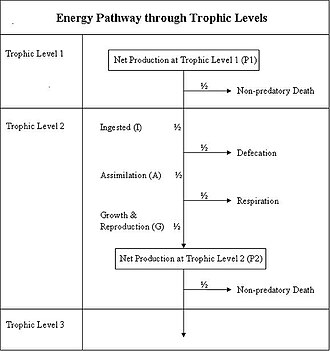Ecological efficiency: Difference between revisions
CSV import Tags: mobile edit mobile web edit |
CSV import |
||
| Line 1: | Line 1: | ||
{{Short description|Overview of ecological efficiency in ecosystems}} | |||
== | == Ecological Efficiency == | ||
[[File:Energy_transfer.jpg|thumb|right|Diagram illustrating energy transfer in an ecosystem.]] | |||
Ecological efficiency refers to the efficiency with which energy is transferred from one [[trophic level]] to the next in an [[ecosystem]]. It is a key concept in [[ecology]] that helps to understand the flow of energy through [[food chains]] and [[food webs]]. | |||
== Trophic Levels == | |||
In an ecosystem, organisms are grouped into different trophic levels based on their source of energy. The primary trophic levels include: | |||
* [[Producers]]: These are typically [[plants]] and [[algae]] that convert [[solar energy]] into chemical energy through [[photosynthesis]]. | |||
* [[Primary consumers]]: These are [[herbivores]] that feed on producers. | |||
* [[Secondary consumers]]: These are [[carnivores]] that feed on primary consumers. | |||
* [[Tertiary consumers]]: These are higher-level carnivores that feed on secondary consumers. | |||
== Energy Transfer == | |||
Energy transfer between trophic levels is not 100% efficient. Typically, only about 10% of the energy at one trophic level is transferred to the next level. This is known as the "10% rule". The rest of the energy is lost as [[heat]], used in [[metabolism]], or left in [[undigested]] parts. | |||
== | == Factors Affecting Ecological Efficiency == | ||
Several factors can influence ecological efficiency, including: | |||
Metabolic efficiency | * [[Metabolic rate]]: Organisms with higher metabolic rates tend to have lower ecological efficiency. | ||
* [[Diet]]: The type of food consumed can affect the efficiency of energy transfer. | |||
* [[Environmental conditions]]: Temperature, availability of resources, and other environmental factors can impact efficiency. | |||
== | == Importance of Ecological Efficiency == | ||
Understanding ecological efficiency is crucial for several reasons: | |||
* It helps in understanding the [[carrying capacity]] of ecosystems. | |||
* It is essential for [[conservation biology]] and managing [[biodiversity]]. | |||
* It provides insights into the [[sustainability]] of [[food production]] systems. | |||
== Related Pages == | |||
* [[Food chain]] | |||
* [[Food web]] | |||
* [[Trophic level]] | * [[Trophic level]] | ||
* [[Energy | * [[Energy pyramid]] | ||
* [[Biomass (ecology)]] | * [[Biomass (ecology)]] | ||
[[Category:Ecology]] | [[Category:Ecology]] | ||
[[Category:Energy (ecology)]] | [[Category:Energy (ecology)]] | ||
Latest revision as of 11:33, 15 February 2025
Overview of ecological efficiency in ecosystems
Ecological Efficiency[edit]

Ecological efficiency refers to the efficiency with which energy is transferred from one trophic level to the next in an ecosystem. It is a key concept in ecology that helps to understand the flow of energy through food chains and food webs.
Trophic Levels[edit]
In an ecosystem, organisms are grouped into different trophic levels based on their source of energy. The primary trophic levels include:
- Producers: These are typically plants and algae that convert solar energy into chemical energy through photosynthesis.
- Primary consumers: These are herbivores that feed on producers.
- Secondary consumers: These are carnivores that feed on primary consumers.
- Tertiary consumers: These are higher-level carnivores that feed on secondary consumers.
Energy Transfer[edit]
Energy transfer between trophic levels is not 100% efficient. Typically, only about 10% of the energy at one trophic level is transferred to the next level. This is known as the "10% rule". The rest of the energy is lost as heat, used in metabolism, or left in undigested parts.
Factors Affecting Ecological Efficiency[edit]
Several factors can influence ecological efficiency, including:
- Metabolic rate: Organisms with higher metabolic rates tend to have lower ecological efficiency.
- Diet: The type of food consumed can affect the efficiency of energy transfer.
- Environmental conditions: Temperature, availability of resources, and other environmental factors can impact efficiency.
Importance of Ecological Efficiency[edit]
Understanding ecological efficiency is crucial for several reasons:
- It helps in understanding the carrying capacity of ecosystems.
- It is essential for conservation biology and managing biodiversity.
- It provides insights into the sustainability of food production systems.